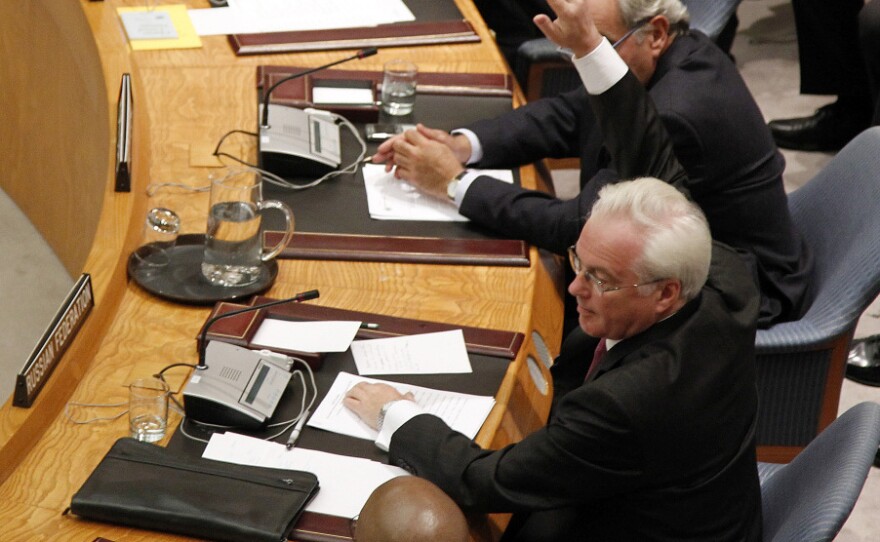Russia's decision to veto a Security Council resolution on Syria last week set off an angry response in Washington.
The two countries sparred publicly, with the U.S. accusing Russia of being on the wrong side of history and Russia complaining that the U.S. can't use the Security Council to promote regime change. With all the mudslinging, it's becoming difficult to know what happened to the Obama administration's "reset" of relations with Russia.
The way Russia's ambassador to the U.N. Vitaly Churkin sees it, the U.S. and its partners are trying to pick and choose who are legitimate leaders in the Arab world. First it was Libya, he says, now they are trying it again in Syria.
"We have to reflect on the concept of legitimacy," Churkin says. "It's a very complicated concept, but what I know for sure [is that] it is not for Paris, Washington or London to pass a definitive judgment about the legitimacy of certain leaders in the Arab world or anywhere else."
U.S. officials shouldn't have been surprised, says Matthew Rojansky of the Carnegie Endowment for International Peace. He says the Russians felt burned by Libya and don't want the Security Council to be in the business of choosing the winners in the Arab uprisings — particularly in Syria.
"They've picked their own winner, and for now that's Bashar Assad, just as it's been the Assad family in Syria for decades," Rojansky says. "There are still weapons sales debts, there are still relationships in the intelligence and military and diplomatic communities that date back to pre-1991 — and these things still have resonance."
And besides, he says, the Russians just see things differently in these Arab uprisings.
"The Russians view it much more cynically," he says. "I don't think they see some sort of deterministic outcome of liberal, Western-style democracy as either desirable or inevitable."
In fact, the Russians have a natural aversion to revolutionary upheavals and international meddling, says Fiona Hill of the Brookings Institution.
"Every military scenario that the Russians basically engage in, in their annual exercises either on their western or eastern flank, always involved some kind of local revolt pulling outside forces," Hill says. "So it is not just a paranoia, this is something they actively prepare against."
There's another reason why the Russians wanted to stand up to the U.S. in the UN Security Council she says — internal politics. The UN vote came soon after Vladimir Putin announced that he'll be switching places with President Dmitry Medvedev.
"In spite of the fact that Mr. Putin has already declared his presidency in effect, it's still an electoral season," she says. "And being forceful with the United States and not letting the United States have its way is always good politics in the Russian domestic environment."
But she says that doesn't mean an end to the Obama administration's reset of relations with Russia. Andrew Kuchins of the Center for Strategic and International Studies agrees.
"The Russians have their own reasons for having their own relationship with us, and for why they support us in Afghanistan, particularly in the new transit corridors," Kuchins says. Or "why they found it in their interest to sign the (Strategic Arms Reduction Treaty). I don't think we should necessarily anticipate that the Russians are going to start applying linkage in their policy toward us, because we really don't toward them."
Analysts say the challenge for the administration is to keep its close ties with Medvedev on track and reopen channels to the president-in-waiting, Putin.
Copyright 2022 NPR. To see more, visit https://www.npr.org. 9(MDAzMjM2NDYzMDEyMzc1Njk5NjAxNzY3OQ001))







